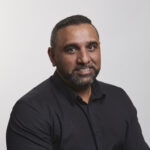Career Path to date
Amanda is currently Deputy Director of Finance at the Royal Orthopaedic Hospital NHS FT, responsible for financial planning, performance, and improvement. Amanda’s NHS career started 14 years ago when she joined the Financial Management Training Scheme in 2008. The scheme is a two-and-a-half-year programme that gives you a breadth of knowledge across different NHS organisations and exposes you to varying finance functions whilst studying an accountancy qualification.
Whilst on the scheme Amanda spent some time working with payroll team, cashiers, procurement, payments receivables, before moving onto financial accounts and helping to put together year end accounts where she got her first experience of auditors.
As part of the scheme Amanda undertook a flexi placement which gives trainees the opportunity to spend a couple of months outside the NHS with the view to bring back that learning to your future placements within the NHS. Her placement was spent with Walsall Housing Group, which is a housing association. ‘This placement allowed me to understand the clear links between housing and health, which are incredibly strong and key to supporting our communities. I would highly recommend any opportunities to expand your knowledge and experience base especially where it will either stretch and develop you as a person or allow you to bring experiences back to your role in the NHS.’
On completion of the scheme Amanda became a Chartered Management Accountant and went on to work in a number of roles in the financial management team in a local acute trust. Firstly, as financial management support for the urgent and acute medicine divisions for 2 years Then an opportunity arose to work as the Head of Transformation for Service Improvement with the same trust which started as a 6 month post but extended to a 2 ½ years in that post. Whilst this role was slightly outside of finance it exposed her to a lot of valuable experience which is still helpful in her career today but following this role Amanda found herself wanting to get back into mainstream finance. So, Amanda took an opportunity to join the Royal Orthopaedic Hospital as Assistant Director of Finance, then secured promotion to current role as Deputy Director of Finance about 18 months ago.
What first attracted you to a career in NHS finance? Did you pick accountancy or the NHS first?
Following school Amanda decided to do a degree in accountancy and whilst in her final year went to a careers fair where she came across the NHS graduate training scheme stall. On the stall Amanda came across someone who was currently on the finance scheme, who spoke of their love for the scheme, the network it gave you, the support it offered and the varying roles that you get exposed to. ‘So for me accountancy came first, but love for NHS followed.’
Career highlights
Whilst working in financial management support Amanda worked on business case collaboratively with colleagues from operational and frontline roles to transform how acute medicine was provided across the trust.
Working on this business case from conception through to transforming the pathway through to seeing the actual difference this made for patients was a real career highlight for Amanda.
Another highlight for Amanda is mentoring and supporting other finance professionals and seeing them achieve their potential and also being a programme manager on the graduate scheme that she was once a trainee on. ‘Watching those around you flourish and achieve their potential is a fantastic feeling, and one that I will never grow tired of’.
Career Challenges
Working through covid has probably been the most challenging time in Amanda’s career, covid brought with it a lot of uncertainty around financial planning, financial envelopes and funding. Not only were there the challenges of work but at the same time you were dealing with the pandemic from personal perspective balancing working life with personal life at home with two young children.
However, despite its challenges it really made Amanda proud to work for NHS and NHS finance during that time. ‘The power of resilience and ability to adapt to support the NHS at a time that they needed it the most made me really proud.’
Typical Day
Working in NHS finance is so varied it is difficult to describe a typical day but Amanda often spends time:
- Working collaboratively with operational and clinical colleagues as well as other support services.
- Working with a more outward focus across the Integrated Care System.
- Spending time on financial planning, short term financial plan or more focus around medium term plan at the moment.
- On the day-to-day financial management support and tasks that need to be done there such as approving the month end position and reviewing the financial forecast.
- Producing reports to service committees and working groups such as Finance and Performance committee.
Career lucky breaks and setbacks
When looking back on her career to date the biggest career setback was when she went for a role in a different organisation and didn’t get the job. At the time there was a lot of reflecting, wondering what she should have done differently, why she didn’t get that role. ‘It was hard at the time to deal with rejection, looking back now it was absolutely the right thing, it just wasn’t the right role for me at that point in my career.’
Looking back Amanda believes that all her career moves have been lucky breaks, right roles have come up at the right time. ‘There has been no set career plan, always been right opportunity at the right time. Every time I have been ready the next role, the right role and the right opportunity has come up for me, working with the right people.’
The Head of Service Improvement role came about as Amanda had already been working with that team in the management accounts role and felt really supported to go for that role. In turn Amanda feels that the role in Service Improvement spring boarded her to have the right skills to step into the right role at the Royal Orthopaedic Hospital.
Most enjoyable thing about current role
‘Making a difference to patients’ is the most enjoyable thing about Amanda’s current role. There was one business case that Amanda worked on which involved a innovative technology to support spinal surgery. Working with the service lead in spinal and translating their vision of using this equipment to make a difference to our patients, that to seeing the new pieces of equipment been wheeled into the hospital, then hearing the difference that makes to patients is powerful. ‘One patient thought it was the end of the line for their treatment for their spinal condition but seeing how this new technology gave them a second chance and how it really changed their lives. I won’t grow old of seeing that in my career.’
Most challenging thing about current role
Finance professionals can help, support and drive lots of initiatives in NHS organisations however there is not an endless supply of people with those skills and expertise so competing priorities can be hard. Amanda thinks the most challenging thing for her is being able to prioritise the many demands, ‘Saying no to people is definitely a hard one for me.’
Skills needed to become a finance professional in the NHS
‘Effective communication is always top of the list when I am asked what is needed to be a good finance professional’. Amanda explains that if you have the ability to be able to communicate to people you will be able to perform well in your role. You have to be able to hold a conversation with clinicians and colleagues, be able to translate the finance language and terminology so it is understandable for non-finance colleagues to make decisions.
‘When I first joined NHS, the thought of being sat across the table with an expert surgeon and hold a conversation about the finance agenda felt scary, but this confidence has developed over time, don’t be afraid to ask questions. Don’t be afraid to ask, what does this mean for patients? What is the procedure you are talking about?’
Mentoring
A part of the finance management graduate scheme having a mentor is actively encouraged and Amanda has had both formal and informal mentors throughout her career. She has found there have been many benefits by having different mentors at different stages in her career, all who have brought with them different skills, experience and backgrounds.
There have been some more formal mentors where Amanda has approached people and asked them for expertise and time. There have also been some more informal ones especially when moving on to new roles, keep relationships going and has seen lots of value in doing so.
‘Networking is one of the key tips for having a long and successful career in NHS. Always someone who had been through what you are going through to help you through guide through situations. I am also a mentor to others and I will look forward to offering that to others throughout my whole career.’
Biggest influence on career
Amanda’s biggest influence on career so far was her Programme manager when she first started the training programme – Mark Axcell who is now Chief Executive Designate for the Black Country Integrated Care Board (ICB). Mark was the was most valuable line manager Amanda has had and really helped support her through the early years in her career. Mark was an amazing role model, everything he teaches he showcases, it taught Amanda the importance of role modelling, she learnt what it means to be an authentic leader. ‘Mark was inspiring, he always shows the value of doing what’s right for the patients and you see that in everything he does, he always puts patients first. He listens to the workforce and really cares about making a difference. He showed me that as an NHS finance professional you can really make a difference.’
Development opportunities
To be well rounded NHS professionals we shouldn’t just be focusing on technical skills we need also to develop the softer skills. In NHS Finance we are really lucky to have a fantastic network of people as well as access to courses and resources. In particular Amanda has found the HFMA network very helpful.
Balancing work and home life
NHS finance goes through peaks and troughs, for example month end and year end and planning periods can be particularly busy.
‘My advice would be make sure it works for you and your home life. Make sure you reset after those busy periods and don’t be afraid to ask for more flexible working when it’s needed.’
Amanda works flexibly, she has two young children and makes sure she does the school pick up twice a week, as that’s important to her and is non-negotiable for her.
Work life balance is a hard one to get right, but a really important one. Amanda has had some advice from mentors that have helped her through that challenge.
Career aspirations
When asked what is next for Amanda, she will continue to take advantage of right opportunities at right time. Continue to support her organisation and ICS achieve its objectives. Other areas Amanda would like to make a difference is reducing Health inequalities and really make a difference to people’s lives.
Amanda will continue to support other finance professionals achieve their potential, she really enjoys seeing colleagues flourish and reaching their potential.
‘As long as I am making a difference, that is the most important thing to me’
Advice to those wanting to start out a career in NHS Finance
‘Do it, it is absolutely a career for life. We need good finance professional to make difference to our patients and communities.’
The graduate scheme gave Amanda the foundation for the career that she has today. The early experiences of orientation, the time spent in different departments and the academic support give you a well-rounded foundation for the future. Amanda is still in touch with many people from her days on the scheme which has given her a good network of people who will continue to help in her career, a network that offers support and guidance when needed.
Those who don’t want to go down that route of the graduate scheme, don’t fear as there are so many opportunities available. We can match skill sets and experience to date with roles available, there are many roles across lots of different organisations. Whether that is acute trust or if you want to be in more strategic organisation, there are so many opportunities available. Get in touch as there are lots of people willing to talk to you about their careers and roles. So many different routes and it really is a fantastic career for life. ‘I never get bored of what I am doing, there is something always new and exciting on the horizon to get involved with.’
Film: The Pursuit of Happiness
Book: The Notebook by Nicholas Sparks
TV show: Friends
Food: Cake




